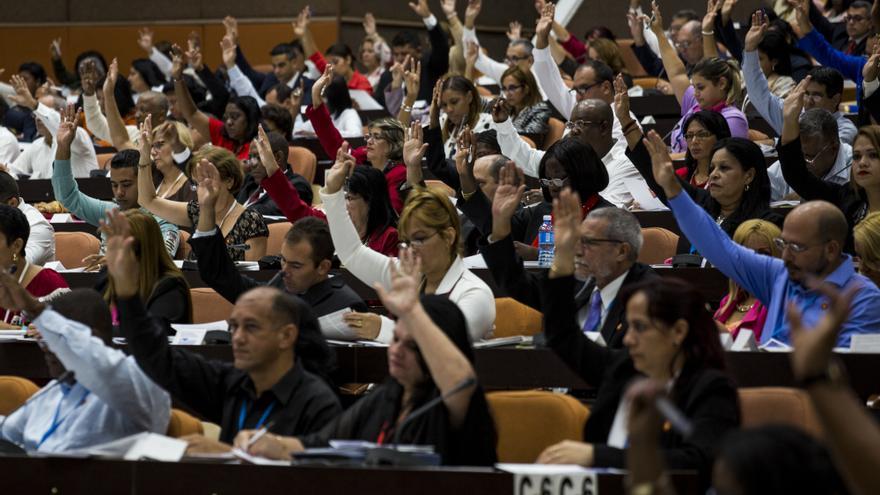
![]() 14ymedio, Reinaldo Escobar, Havana, 13 August 2019 — It is less than 60 days before the National Assembly of Popular Power elects the president and vice president of the Republic. In the same act, the three highest positions of the Parliament — president, vice president and secretary — and the other members of the State Council will also be elected.
14ymedio, Reinaldo Escobar, Havana, 13 August 2019 — It is less than 60 days before the National Assembly of Popular Power elects the president and vice president of the Republic. In the same act, the three highest positions of the Parliament — president, vice president and secretary — and the other members of the State Council will also be elected.
This is the method to fulfill the second transitory provision of the current Constitution, which specified a period of three months from the approval of the Electoral Law, so that the Parliament could choose these positions from among its deputies.
“And what do the polls say?” asks the jokester.
This is the question asked by political scientists in most countries since electoral processes begin to be profiled. For example, in mid-August Argentina and Guatemala held elections; Argentines published surveys starting in October of last year and Guatemalans did so as of March of this year, when it was not yet known that there would be a second round.
That does not happen in Cuba, because preparing the nominations for the aforementioned positions is formally the job of the National Candidacy Commission, composed of members of the main “mass organizations” of the country and in these lists there are not different candidates to choose among, only names to approve. One name for each position.
Right now, the first breach of the provisions of the new Electoral Law could be taking place, which, in its sixth transitory provision, gave a period of 30 days for the directors of the mass organizations to designate their representatives in the National Candidacy Commission.
If we read the first special provision of the law itself, it is understood that for the calculation of the positions and terms “the days are understood as calendar days, unless otherwise expressly provided by the competent authority.”
As of today, August 13, 31 days have passed since that July 13 in which the Electoral Law was passed and the press has not said a word about these appointments. On Parliament’s digital site there is no mention that mass organizations have submitted their proposals for members of the National Nominations Commission.
Although it is no secret to anyone that Miguel Díaz-Canel will be appointed president of the Republic, the other positions are not so clearly defined. What a curious thing: in the official press nobody speculates, nobody asks, nobody makes proposals. In this matter, as in many others, the mystery syndrome prevails.
The date of October 10 is probably adopted for the inauguration of the new president. It is notorious that the civil offices of the Republic take possession on dates marked by military deeds: October 10 marks the beginning of the first war of independence; February 24 marks the beginning of the second; and April 19 the “Victory of Playa Girón,” known to the north as the Bay of Pigs.
In response to the limitation of two five-year terms for senior political and government officials, there was a question of how the time since April 19 would be considered, during which the certain candidate for President of the Republic, Miguel Díaz-Canel took possession of his current position as president of the Councils of State and Ministers. Will it be counted as a prior preliminary stage or will it be recorded as time served in the new position?
The answer is offered by the third transitory provision of the new Electoral Law that specifies that the current election will be “on this occasion, for the remainder of this mandate” that is, until April 2024. If those who wrote this provision did not know beforehand that the “next” president is going to be the same person who holds the position today, with another denomination, they would not have introduced this clause, because if it were someone else, they would be subtracting six months from that person’s five-year term.
As for the changes in Parliament, we will have to wait for the same date, which is clear from the first special provision of the Constitution that states that the deputies of the IX legislature “remain in their positions until their term ends.”
Miguel Díaz-Canel exhibits an impeccable conduct in his intention to give continuity to the legacy of the historical generation. Furthermore, he will probably not have taken one unearned peso from public funds, nor will he engage in any nepotistic behaviors to benefit his relations. But he will not have been chosen by the people.
Not even the most-committed gamblers will place bets on the result of this appointment. There will be no one going out to the balconies of their homes to shout cheers, or joy inside homes in front of the television screen when the monotonous voice of the president of the Electoral Commission pronounces the name of the new head of state. Not even among his supporters.
That’s how tedious and boring these processes are in this country. With less than 60 days to know the result of these inappropriately named elections, there are no campaigns or debates, much less scandals. Not only are the surveys missing, the great absentee is popular enthusiasm.
_____________________________
The 14ymedio team is committed to serious journalism that reflects the reality of deep Cuba. Thank you for joining us on this long road. We invite you to continue supporting us, but this time by becoming a member of 14ymedio. Together we can continue to transform journalism in Cuba.
